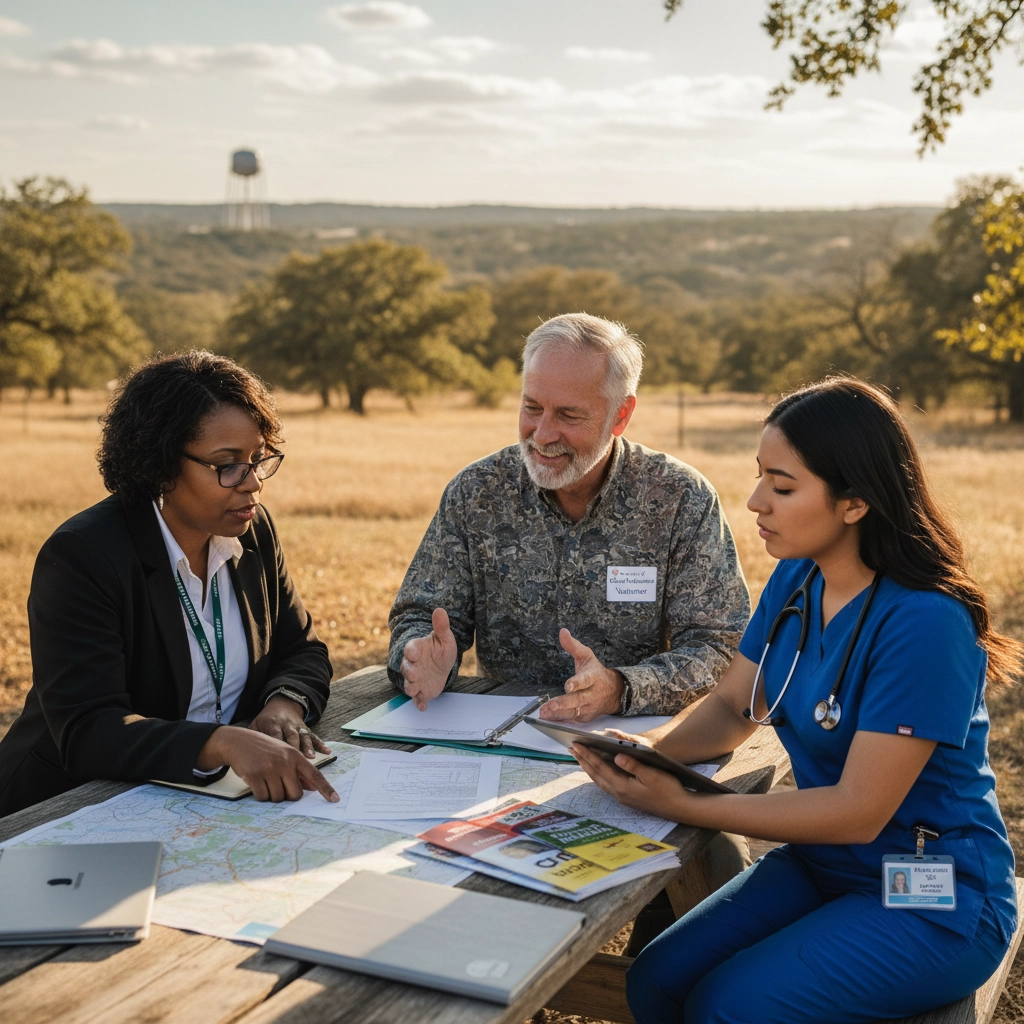Cries for Help: 5 Signs Your Community Needs More Mental Health Resources (Free Assessment Guide)
- Tazora Moore
- Oct 24, 2025
- 5 min read
SAVE A LIFE TODAY – If you're leading a church, school, clinic, or community center in Texas, this assessment guide could help you identify critical gaps before it's too late.
Mental health crises don't announce themselves with flashing warning signs. But your community is speaking – through cries for help that often go unnoticed until tragedy strikes. As leaders in underserved Texas communities, you have the power to recognize these warning signals and take action.
This FREE assessment guide reveals five unmistakable signs that your community desperately needs more mental health resources. Don't wait for another family to lose someone they love.
Sign #1: EMPTY CHAIRS AND OVERWHELMING WAIT LISTS
YOUR COMMUNITY IS SCREAMING FOR HELP WHEN:
• Residents drive 50+ miles to find a therapist or counselor • Mental health appointments are booked 3-6 months in advance • Emergency rooms become the default crisis intervention center • People give up seeking help because services are too far or too expensive • NO LOCAL OPTIONS exist for immediate crisis support

Churches and schools see this every day – families asking where to turn when their teenager is struggling, parents desperate for guidance when depression hits their household. When your community lacks accessible mental health services, people suffer in silence or turn to harmful coping mechanisms.
The brutal reality: Rural and underserved Texas communities often have ONE therapist for every 10,000+ residents. That's not enough. That's a crisis waiting to explode.
Sign #2: RISING DESPERATION IN EVERYDAY CONVERSATIONS
LISTEN FOR THESE CRIES FOR HELP:
• "I don't know what to do anymore" becomes a common phrase in your hallways • Suicide prevention charity near me searches spike in your area • Community members openly express feeling hopeless or overwhelmed • Teachers report more behavioral issues and emotional outbursts from students • Pastors hear confessions of suicidal thoughts more frequently
When people start verbalizing their struggles publicly, they've moved beyond the shame barrier – but they still need immediate, accessible support. If your community members are crying out and finding empty spaces where help should be, you have a resource crisis.
CRITICAL ACTION NEEDED: Document these conversations. Track the frequency. This data becomes crucial when advocating for suicide prevention charities and funding.
Sign #3: COMMUNITY TRAGEDIES THAT COULD HAVE BEEN PREVENTED
THE MOST HEARTBREAKING SIGN:
• Suicide rates in your community exceed state or national averages • Multiple families affected by mental health crises within a short timeframe • Young people expressing that they have "nowhere to turn" • Community leaders feel powerless to help struggling members • Local news reports mental health emergencies regularly

Every preventable tragedy represents a failure of our support systems. When communities lose members to suicide, it's often because cries for help went unanswered – not because people didn't care, but because resources simply didn't exist.
Texas communities deserve better. Every church, school, and community center should have direct connections to suicide awareness charity resources and crisis intervention support.
Sign #4: FINANCIAL BARRIERS BLOCKING ACCESS TO HOPE
MONEY SHOULDN'T DETERMINE WHO GETS TO LIVE:
• $$$ Families choosing between groceries and therapy sessions $$$ • Insurance coverage gaps leaving people without options • No sliding-scale or FREE mental health services available locally • Community fundraisers regularly supporting families in crisis • $$$ Mental health becomes a luxury only the wealthy can afford $$$
When seeking help requires choosing between basic needs and mental health support, your community needs suicide prevention donation programs and FREE resource networks immediately.
The solution exists:Suicide prevention nonprofit organizations like Hear My Cry Foundation provide FREE resources and referrals specifically for underserved communities. No one should face financial barriers when seeking mental health support.
Sign #5: CULTURAL AND STIGMA BARRIERS SILENCING VOICES
YOUR COMMUNITY NEEDS CULTURALLY RESPONSIVE RESOURCES WHEN:
• Men refuse to seek help due to "toughness" expectations • Religious communities struggle to integrate faith with mental health support • Language barriers prevent non-English speakers from accessing services • Cultural shame around mental illness keeps families isolated • Minority communities feel unwelcome in existing mental health spaces

Breaking down barriers requires intentional action. Communities need suicide prevention charities that understand local culture, language needs, and religious considerations. Generic, one-size-fits-all approaches fail when cultural sensitivity is ignored.
FREE COMMUNITY ASSESSMENT TOOL
TAKE ACTION RIGHT NOW – ASSESS YOUR COMMUNITY:
Step 1: Count your current mental health resources
How many therapists serve your area?
What FREE crisis intervention services exist?
Are services culturally appropriate for your population?
Step 2: Survey your community members
Ask directly: "Where would you go for mental health support?"
Document transportation and financial barriers
Identify gaps in age-specific services (youth, elderly, adults)
Step 3: Map your referral network
List every suicide awareness charity in your region
Identify 24/7 crisis support options
Create emergency contact resources for immediate distribution
Step 4: Document the need
Track cries for help you encounter monthly
Record barriers people face when seeking support
Measure the impact on families and individuals
YOUR COMMUNITY NEEDS IMMEDIATE SUPPORT
If you identified THREE OR MORE of these signs in your Texas community, you're facing a mental health resource crisis. But hope exists, and help is available RIGHT NOW.

Hear My Cry Foundation specializes in supporting underserved Texas communities with FREE mental health resources, crisis intervention referrals, and community education programs. We understand the unique challenges facing churches, schools, clinics, and community centers in areas where resources are scarce.
$$$ NO COST TO YOUR ORGANIZATION $$$
Our suicide prevention nonprofit provides:
FREE crisis intervention resource lists
Community education presentations
Referral networks for immediate support
Cultural competency training for community leaders
Emergency support planning assistance
CONTACT US TODAY – LIVES DEPEND ON IT
Phone: 214-988-9161 Website:https://www.hearmycryfoundation.org Email:info@hearmycryfoundation.org****
Don't wait for another tragedy. Your community's cries for help deserve immediate attention and professional response.
TAKE ACTION NOW
TOP OF PAGE TO BOTTOM OF PAGE – EVERY SECTION OF THIS GUIDE POINTS TO ONE TRUTH:
Your community members are crying for help. Whether through empty therapy offices, rising desperation, preventable tragedies, financial barriers, or cultural silence – the need is URGENT and the solutions are available.
DONATE to suicide prevention efforts in your community. CONNECT with established suicide prevention charities. ADVOCATE for increased mental health resources in underserved Texas areas.
Hear My Cry Foundation stands ready to support your community immediately. We provide FREE resources because we believe every Texas community deserves access to life-saving mental health support.
Visithttps://www.hearmycryfoundation.orgtoday.
DONATE. CONNECT. SAVE LIVES.
The time for action is NOW. Your community's mental health crisis won't solve itself, but together, we can ensure that every cry for help receives a compassionate, professional response.
Your community is counting on you. Don't let them down.



Comments